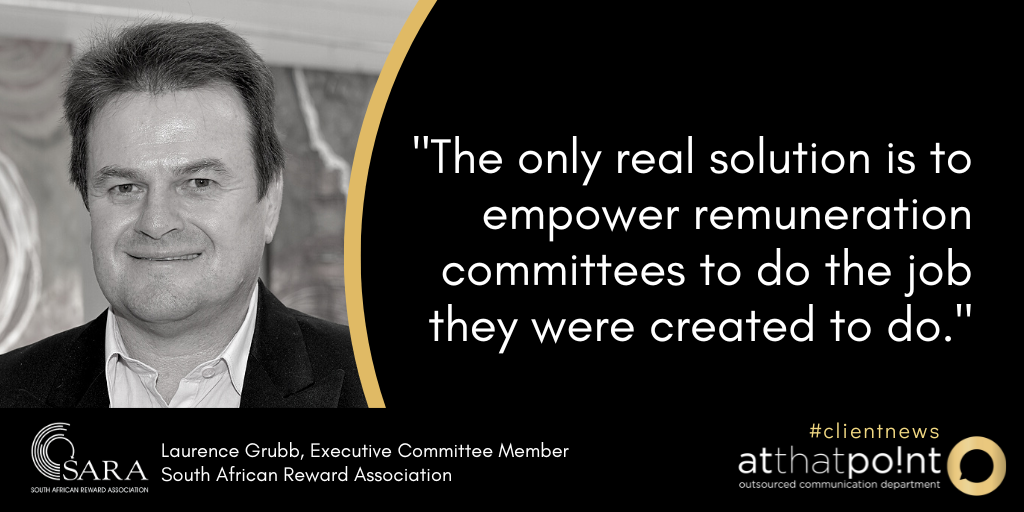|
Whether or not executives earn too much and, if so, how to address executive remuneration practices, are two questions that continue to nag at global society.
“The pressure is even greater in South Africa, where inequality, poverty and unemployment are more pronounced,” says Martin Hopkins, Master Reward Specialist and past president of the South African Reward Association (SARA). The King IV Report on Corporate GovernanceTM recommends several approaches to governing executive reward. One is to give investors a greater say through remuneration voting. But what is it and what material effect does such a vote offer? What remuneration voting means King IV calls for executive remuneration in each company to be disclosed to investors through a remuneration report that has three parts: a background statement, an overview of the remuneration policy, and an implementation report. Further, shareholders are given the opportunity to pass a separate non-binding advisory vote on the policy and the implementation report. If 25% or more of the voting rights exercised by shareholders are against the remuneration policy or the implementation report, or both, the remuneration policy should specify the measures committed to by the board to respond to this voting outcome. These measures should include investor engagement and addressing objections and concerns, although King IV does not specify what format they should take or how they should be implemented. King IV is not enforceable by law; it is simply presented as a framework for good corporate governance. However, its influence is “given teeth” when its recommendations are adopted by regulators with the power to enforce them. This is true of the Johannesburg Stock Exchange (JSE) Listing Requirements, which makes certain of its practices mandatory for publicly traded companies. So, within the JSE's purview, remuneration voting is compulsory, not optional. Even so, a non-binding advisory vote by shareholders has no legal effect on the adoption of the remuneration policy or the implementation report. It simply allows the organisation's management and remuneration committee to gauge sentiment towards their provisions. That said, the vote serves as a powerful barometer of the company’s governance quality and of investor confidence. Should shareholders have more power? The effect of giving shareholders more say in how much executives earn is widely debated. They have a strong economic interest in good governance as well as a moral obligation towards equitable pay. At the same time, giving investors too much power may unduly affect the ability of the Board to govern and management to operate the company effectively. Investor activism can be a powerful force for good, but ultimately the directors need to balance the needs of many stakeholders and make balanced decisions that are overly influenced by any single voice. Measures to provide for increased shareholder power are currently being debated by various interest groups, with measures such as a binding vote on the remuneration policy and/or the implementation report and the so-called “two strike” rule being considered. The binding vote means that the directors must adhere to the provisions of the approved policy and may not apply their discretion to vary the policy terms without shareholder approval. The “two-strike” rule would mean that in the case of two successive votes of more than 25% against the remuneration policy or implementation report the members of the Remuneration Committee would have to step down from the committee for at least two years, and be replaced by other members of the Board. There is diverse practice on remuneration voting in developed and developing countries, with a binding vote on the remuneration policy at a 50% threshold in place in the UK, which is viewed as being reasonably effective, and non-binding voting practices in the US and Canada. Australia has adopted the “two-strike rule” with limited success. Reward perspective Hopkins notes that while there is a great deal of emotion regarding executive pay it's also important to recognise that it is not at all clear that executive pay can be dramatically reduced without damage to the ability of business to generate shareholder value and create jobs. Market forces mean that any one company within a country can’t dramatically reduce executive pay without immediate loss of skills and leadership. If regulations in a country systemically reduce all executive pay then mobile highly skilled executives may well move to other countries which have no such regulations. Many companies aspire to pay their executives in line with their contribution to business profitability and reward them against agreed performance milestones. King IV was developed to reign in excessive remuneration practices, not prevent companies from fairly rewarding employees for their contribution and performance. “Organisations should also look at the other end of the pay fairness equation, with increasing focus on the pay gap and how this should be measured and addressed”, says Hopkins. Together with caution in respect of executive pay, measures to increase the pay of the lowest paid staff, whilst remaining economically competitive is another important reward factor to consider. “This is a complex issue”, concludes Hopkins. Business leadership cannot disregard calls from many quarters to address these issues, but must also seek to balance the views of multiple stakeholders with the pressing need for economic growth and job creation. ENDS MEDIA CONTACT: Rosa-Mari Le Roux, 060 995 6277, [email protected], www.atthatpoint.co.za For more information on SARA please visit: Website: www.sara.co.za Twitter: @SA_reward LinkedIn: South African Reward Association Facebook: SARA – South African Reward Association
0 Comments
Leave a Reply. |
Archives
March 2023
Welcome to the South African Reward Association newsroom.
Categories
All
|


 RSS Feed
RSS Feed